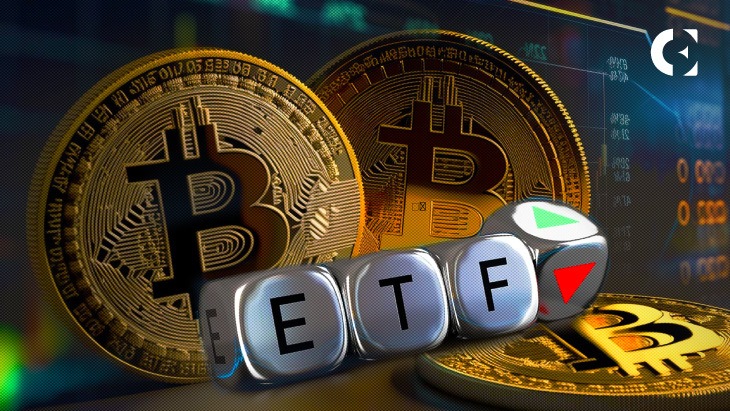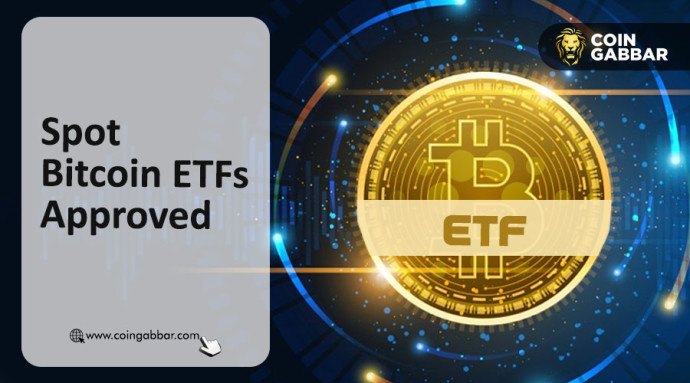In the ever-evolving landscape of investment, Bitcoin ETFs (Exchange-Traded Funds) have emerged as a beacon for both seasoned investors and newcomers alike, keen on exploring the burgeoning world of cryptocurrency without delving into the complexities of direct ownership. As the financial ecosystem continues to embrace digital currencies, understanding Bitcoin ETFs becomes crucial for those looking to diversify their investment portfolio with the digital gold of the 21st century.
Toc

What is a Bitcoin ETF?
A Bitcoin ETF is an investment fund traded on stock exchanges, much like stocks. It tracks the price of Bitcoin, offering investors the opportunity to buy into the Bitcoin market indirectly through traditional brokerage accounts. This mechanism sidesteps the technical hurdles associated with buying, storing, and securing Bitcoin directly, making it an attractive option for individuals and institutions alike.
Why Bitcoin ETFs?
Accessibility and Simplicity: Bitcoin ETFs democratize access to cryptocurrency investments, allowing individuals to participate through platforms and mechanisms they are already familiar with. This simplicity extends to tax reporting and portfolio tracking, integrating seamlessly with traditional investment tools.
Regulatory Oversight: Operating within the framework of regulated financial markets, Bitcoin ETFs offer a layer of security and legitimacy, addressing concerns around the volatility and regulatory ambiguity that can accompany direct cryptocurrency investments.
Market Exposure: For investors looking to hedge against inflation or diversify their portfolio, Bitcoin ETFs provide exposure to the cryptocurrency market’s potential returns without the need to engage directly with the crypto ecosystem.

The Current Landscape and Top Bitcoin ETFs
The long wait is over! As of January 2024, the SEC finally greenlit the first spot Bitcoin ETFs in the US, opening up a new avenue for investors to gain exposure to the king of cryptocurrency. While the market is still young, several ETFs have emerged as leaders in terms of Assets Under Management (AUM). Here’s a breakdown of the current top contenders:

- Blackrock’s Bitcoin ETF, the iShares Bitcoin Trust (IBIT), is a strong contender in the young market for spot Bitcoin ETFs in the US. Launched in January 2024 alongside the first wave of SEC-approved spot ETFs, IBIT has quickly gained traction with investors.
- Grayscale Bitcoin Trust (GBTC): Though technically now an ETF, GBTC holds the historical title of the largest Bitcoin investment vehicle in the US. It boasts a massive AUM built during its time as a trust. However, GBTC currently trades at a premium to its net asset value (NAV), meaning you might pay more than the underlying Bitcoin is worth.
- ProShares Bitcoin Strategy ETF (BITO): Launched in October 2021, BITO was among the first Bitcoin futures ETFs to hit the market. This ETF tracks Bitcoin futures contracts, offering indirect exposure to Bitcoin’s price movements.
- Valkyrie Bitcoin Strategy ETF (BTFD): Similar to BITO, BTFD is a Bitcoin futures ETF that debuted in October 2021. These futures-based ETFs offer a regulated way to invest in Bitcoin, but their returns may differ slightly from the actual price movements of Bitcoin.
- VanEck Bitcoin Strategy ETF (XBTF): Another player in the Bitcoin futures ETF space, XBTF entered the scene in October 2021. Like its counterparts, it offers a regulated alternative for investors seeking Bitcoin exposure.
- Fidelity Wise Origin Bitcoin Fund (FBTC): This unique ETF, launched in January 2024 alongside the first spot Bitcoin ETFs, actually holds actual Bitcoin. This means its price should more closely track the spot price of Bitcoin compared to futures-based ETFs. However, FBTC is still relatively new, and its long-term performance remains to be seen.

Important Considerations:
- Spot vs. Futures: Spot Bitcoin ETFs hold actual Bitcoin, while futures-based ETFs track Bitcoin futures contracts. This can lead to slight performance differences.
- Fees: Bitcoin ETFs may have higher expense ratios than traditional ETFs due to the complexities of holding or tracking Bitcoin.
- Volatility: While offering potentially less volatility than directly buying Bitcoin, Bitcoin ETFs are still subject to the inherent price fluctuations of the cryptocurrency market.
- Newcomer: While IBIT has shown promise, it’s still a relatively new product. Its long-term performance and track record remain to be established.
Bitcoin ETFs vs. Gold ETFs: A Tale of Two Titans

The world of investment offers a plethora of options, and two prominent asset classes vying for investor attention are Bitcoin and gold. Both Bitcoin ETFs and Gold ETFs provide indirect ownership, but their characteristics differ vastly. Let’s delve into the key areas to compare:
Underlying Asset:
- Bitcoin ETFs: These can be either spot ETFs, holding actual Bitcoin, or futures ETFs, tracking Bitcoin futures contracts.
- Gold ETFs: These hold physical gold bullion stored in secure vaults around the world.
Performance:
- Bitcoin ETFs: Bitcoin boasts a history of explosive growth but also dramatic price swings. Bitcoin ETFs are likely to mirror this volatility.
- Gold ETFs: Gold is known as a safe-haven asset, historically appreciating in value during economic turmoil. Gold ETF prices tend to be more stable than Bitcoin ETFs.
Volatility:
- Bitcoin ETFs: Buckle up! Bitcoin is notorious for its wild price fluctuations. Expect significant ups and downs with Bitcoin ETFs.
- Gold ETFs: While not immune to price movements, Gold ETFs generally experience less volatility compared to Bitcoin ETFs.
Liquidity:
- Bitcoin ETFs: Traded on stock exchanges, Bitcoin ETFs offer high liquidity, allowing for easy buying and selling.
- Gold ETFs: Though highly liquid, Gold ETFs might have slightly less liquidity compared to Bitcoin ETFs due to the underlying physical asset.
Fees:
- Bitcoin ETFs: The complexities of holding or tracking Bitcoin can lead to higher expense ratios for Bitcoin ETFs compared to traditional ETFs.
- Gold ETFs: Fees for Gold ETFs tend to be lower than Bitcoin ETFs due to the established infrastructure for storing and managing gold.
Investment Strategy:
- Bitcoin ETFs: Suitable for investors with a high-risk tolerance seeking potential for high returns. Bitcoin can be a part of a long-term, well-diversified portfolio.
- Gold ETFs: Ideal for investors seeking a hedge against inflation or market volatility. Gold ETFs offer a way to add stability and diversification to a portfolio.
Here’s a table for a quick comparison:
| Feature | Bitcoin ETFs | Gold ETFs |
|---|---|---|
| Underlying Asset | Bitcoin or Bitcoin futures contracts | Physical gold bullion |
| Performance | Potentially high growth with high volatility | Slower growth with more stability |
| Volatility | High | Lower |
| Liquidity | High | High (slightly less than Bitcoin ETFs) |
| Fees | Potentially higher | Lower |
| Investment Strategy | High-risk, high-reward | Stability and diversification |
Conclusion

Bitcoin ETFs stand at the forefront of financial innovation, offering a bridge between the traditional investment world and the digital currency space. As the market for these funds expands and evolves, they promise to play a pivotal role in shaping the future of investment, making the allure of cryptocurrency accessible to a broader audience without the complexities of direct ownership. For those looking to explore the dynamic world of cryptocurrency through a familiar investment lens, Bitcoin ETFs may offer the perfect starting point. However, it’s important to understand that while these funds may provide a convenient and potentially profitable option, they come with their own set of risks and fees.
One of the main advantages of Bitcoin ETFs is their high level of accessibility. Unlike investing in cryptocurrencies directly, which often requires specialized knowledge and technical expertise, Bitcoin ETFs can be traded on traditional stock exchanges through a standard brokerage account. This makes them an attractive option for those looking to dip their toes into the world of cryptocurrency without committing to a significant investment or navigating complex platforms.
However, it’s crucial to note that while Bitcoin ETFs offer convenience, they also come with additional fees. These fees are typically charged by the fund management company and cover expenses such as marketing, legal compliance, and custodial services. Additionally, the price of Bitcoin ETFs can also be affected by market demand and supply, just like any other stock or asset.
Another key advantage of Bitcoin ETFs is their potential for diversification. By investing in a Bitcoin ETF, investors gain exposure to multiple cryptocurrencies without having to purchase each one individually. This reduces risk as it spreads out the investment across different assets.
Moreover, Bitcoin ETFs offer a level of security that some may find reassuring. With traditional cryptocurrency investments, there is always the risk of losing access to funds due to hacking or forgetting passwords. However, with Bitcoin ETFs, the fund management company holds custody of the underlying assets on behalf of investors, reducing this risk.
Finally, Bitcoin ETFs offer the opportunity for institutional investors to enter the cryptocurrency market. Many institutions have been hesitant to invest in cryptocurrencies due to regulatory concerns and lack of infrastructure. However, by investing in a Bitcoin ETF, institutions can gain exposure to the cryptocurrency market without having to navigate these challenges.
However, it is important to note that Bitcoin ETFs are not immune to volatility and risk. As with any investment, there is always the potential for loss and it is important for investors to carefully consider their own risk tolerance before making any investment decisions.
In summary, Bitcoin ETFs offer a convenient and potentially less risky way for investors to gain exposure to the growing world of cryptocurrencies. They provide diversification, security, and access for institutional investors, while also allowing individuals to easily add cryptocurrency assets into their investment portfolios. As the crypto market continues to evolve and mature, Bitcoin ETFs may become an increasingly popular option for those looking to participate in this exciting and rapidly expanding industry.












